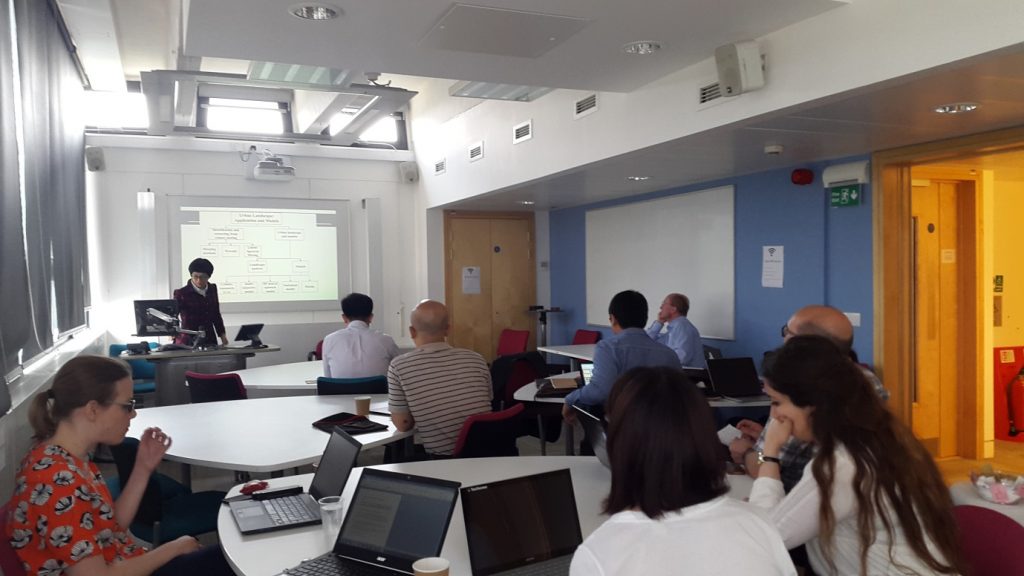City-REDI held a workshop last week with its sister research centre based at Guangzhou University, Guangdong, China. This was an ideal opportunity for the two research centres to share research ideas and approaches and to explore opportunities for on-going collaboration.

In May 2016, a linked research centre to City-REDI was established in Guangzhou, China. With a shared focus on city-regional transformation, the two institutions have been building links over the past year in view of working together on a number of joint research projects. The workshop was, therefore, an ideal opportunity to progress this affiliation further, with a series of presentations from members of the team from Guangzhou University providing a good insight into their specific research interests, technical expertise, and details of current projects that City-REDI can relate to and learn from.
The workshop was opened by Dr Xiaoyue Chen whose presentation was entitled ‘Multiscale Analysis of Urban Expansion in Urban and Peri-Urban Areas’. This research investigates urban expansion using remote sensing data in the form of images. Specialist techniques are then used to visualise, manipulate, and analyse these images within an integrated Geographic Information System (GIS). This project follows Dr Xiaoyue Chen’s continued interest in land use change detection using remote sensing and GIS.
The second presentation ‘Where do we go to the office, more economically vs more healthily?’ by Dr Di Cai explored health concerns as a key driving force behind office relocations in the city of Guangzhou to areas where there is more green space, lower air pollution and less building density. This follows the emphasis that is currently being placed on the important of healthy living by policymakers and government officials in China. Dr Di Cai has previously worked on projects examining air quality change in multi-city systems, regional knowledge spillovers, and the influencing factors and spatial distribution of high-rise residential prices in China.
Up next was Professor Jianzhou Gong who presented her research on ‘Ecosystem Services oriented study to optimise the urban landscape in Guangzhou, China’. This research aims to use ecosystem services evaluation as a way to gain a better understanding of the urban environment, especially in developing countries where urban problems are currently being most acutely experienced as a result of rapid urbanisation. The evaluation uses field-based survey data to examine urban intensity and the capacity of ecosystems to provide goods and services to urban dwellers.
Continuing this association between rapid urbanisation and a rise of urban problems, Dr Chong Xu gave his presentation on ‘Spatial Heterogeneity of Micro-spatial Factors’ Effects on Street Robberies – A Case Study of DP Peninsula’. Utilising rationale choice theory for understanding opportunities for crime, the study looks at the relationship between different spatial environments and incidents of robberies. One key finding of the study related to the effects of multiple micro-spatial factors on the density of street robberies that are significantly non-stationary across space. Dr Chong Xu therefore provided insights into how to implement more specific and effective crime prevention policies, as well as the other side of China’s development story that is often overlooked such as joblessness and unemployment.
To end the session, Dr Shi Xian presented her research on ‘Urban Regeneration and ‘Compressed Gentrification’: A Case Study of ‘Energizing Kowloon East’, Hong Kong’. Utilising gentrification wave theory, the study traced the transition of gentrification over a forty year period from cultural-led, to capital-led and finally policy-led periods of gentrification in the case study area. This gave an excellent insight into Shi Xian long-term research agenda which will give focus to mobility and social segregation, urban renewal and the revitalisation of industrial buildings, urban competitiveness and regional inter-city cooperation, and urban transformation and “green shift” of China’s urban entrepreneurialism.
To sign up to our blog mailing list, please click here

2 thoughts on “City-REDI welcomes Guangzhou University”